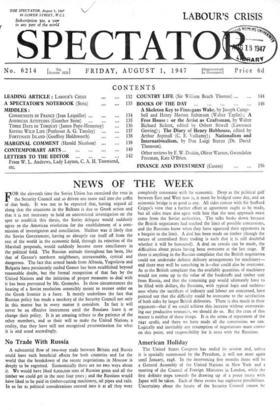No Trade With Russia
A substantial flow of two-way trade between Britain and Russia could have such beneficial effects for both countries and for the world that the breakdown of the recent negotiations in Moscow is deeply to be regretted. Economically there are no two ways about it. We would have liked 6,000,000 tons of Russian grain and all the timber we could get in the next four years ; and the Russians would have liked to be paid in timber-cutting machinery, oil pipes and rails. In so far as political considerations entered into it at all they were completely consonant with the economic. Deep as the pciitical gulf between East and West now is, it must be bridged some day, and an economic bridge is as good as any. All sides concur with Sir Stafford Cripps's view that a further effort at agreement ought to be mad; but all sides must also agree with him that the next approach must come from the Soviet authorities. The talks broke down because the British negotiators had reached the limit of possible concessions, and the Russians know when they have squeezed their opponents in a bargain to the limit. A deal has been made on timber (though the nature of centralised State trading is such that it is still doubtful whether it will be honoured). A deal on cereals can be made, the difficulties about prices having been overcome at the last stage. If there is anything in the Russian complaint that the British negotiators could not undertake definite delivery arrangements for machinery— and there may well be something in it—that could also be overcome. As to the British complaint that the available quantities of machinery would not come up to the value of the foodstuffs and timber sent from Russia, and that the remaining gap would ultimately have to be filled with dollars, the Russians, with typical logic and ruthless- ness where the sacrifices of industry and labour are concerned, have pointed out that the difficulty could be overcome to the satisfaction of both sides by larger British deliveries. There is this much in their argument—that if we could achieve this increase without overstrain- ing our productive resources, we should do so. But the crux of this matter is neither of these things. It is the terms of repayment of the 1941 credit, and there we have made all the concessions we can. Logically and inevitably any resumption of negotiations must centre on this point, and responsibility for it rests with the Russians.


































